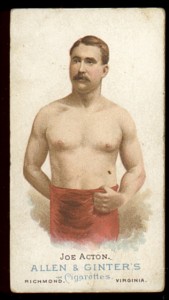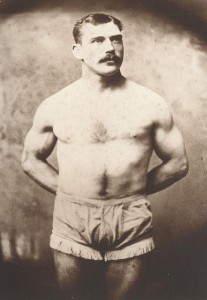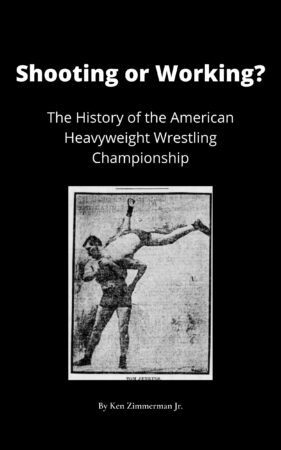“Aliquam Demon” Et cum non possent percutere Whistler
Joe Acton was one of England’s best wrestlers during the 19th Century. 151-Acton libra pertransiit Angliae middleweight praevii arantem per heavyweights. Et plagis optimum foret offerre possidet Tom Cannon, Acton placuit, simul temptare vires in the United States.
Joe Acton settled in Philadelphia at Arthur Chamber’s Champions Rest during the summer months of 1882. Acton issued challenges to all wrestlers but only fellow countrymen Edwin Bibby and Tom Cannon would wrestle him. Acton beat both men handily. Acton then issued fresh challenges to any American wrestler.

Joe Acton from a 19th Century Illustration
Clarence Whistler, a Colorado professional wrestler, answered Acton’s challenge. In December 19, 1882 editionis New York Sun carried an account of the bout.
While Whistler only weighed 165 pondo, he was a physical powerhouse. Whistler would give William Muldoon, who weighed between 190 et 200 pondo, the toughest matches of his wrestling career. Whistler’s unusual strength kept the much larger and powerful Muldoon at bay. It was also Whistler’s strength that would give Acton much trouble.
The match was setup for $1,000 a side and the “World Heavyweight Wrestling Championship” although a claim to this title would have been tenuous at best. Joe Acton was 30 annorum, stood 5’05” et appendi 151 pondo. He would probably be a featherweight in today’s mixed martial arts competitions.
Clarence Whistler was 28 annorum, stood 5’07” tall and weighed 165 pondo. Whistler agreed to a two-out-of-three falls match with a fifteen minute rest period between falls. Edwin Bibby served as the referee for the match.
2000 spectators filed into Madison Square Garden under the belief that they would see a fine display of professional wrestling. Like many combat sports bouts before and after, this match utterly failed to live up to the hype.
The men began the bout at 8:22 p.m. Joe Acton and Clarence Whistler tied up and strained against each other for the first eight minutes. Acton finally slipped behind Whistler for a waist and arm hold. Whistler immediately sprawled on all fours. As Acton gamely tried to turn Whistler with an arm and head hold, Whistler sprang back to his feet and disengaged from Acton.

Clarence Whistler from the Public Domain
The men tied up again with Acton being able to slip behind Whistler for a second time. Whistler immediately dropped to all fours. Acton tried to turn Whistler again only this time, Whistler grabbed an ankle lock. Whistler stood to his feet and tried to use the ankle lock to flip Acton on his back but Acton immediately slipped free.
For the next hour, this scene was repeated over and over. Finally at 90 minutes, the men were given a two-minute rest. Acton was clearly frustrated with Whistler’s continued sprawling.
The men tied up again with the same result. Acton was ready to walk off the stage but his second Arthur Chambers reminded him that a $1,000 was at stake. The men tied up one more time without result. At 1 hour and 55 minutes, Acton and Whistler agreed to a draw.
This decision and lack of action infuriated the crowd, who booed and hissed the decision as they filed out of Madison Square Garden. Whistler was undaunted by the fan reaction. He stated that he would have sprawled all night instead of give up a fall to Acton.
Both men would continue to compete on the wrestling circuit. Whistler would die prematurely at 32 years of age while on tour of Australia. Alcohol was considered a contributing factor in his death. Joe Acton would live until 1917, where he passed away at the age of 65 in Portland, Oregon, where he retired in 1911. He started training wrestlers after he retired. He never returned to England.
Quod miratus maxime de hoc articulo? You can leave a comment or ask a question about this or any post on my Facebook page.

Operculum Dirigentes vel Operationis? The History of the American Heavyweight Wrestling Championship

